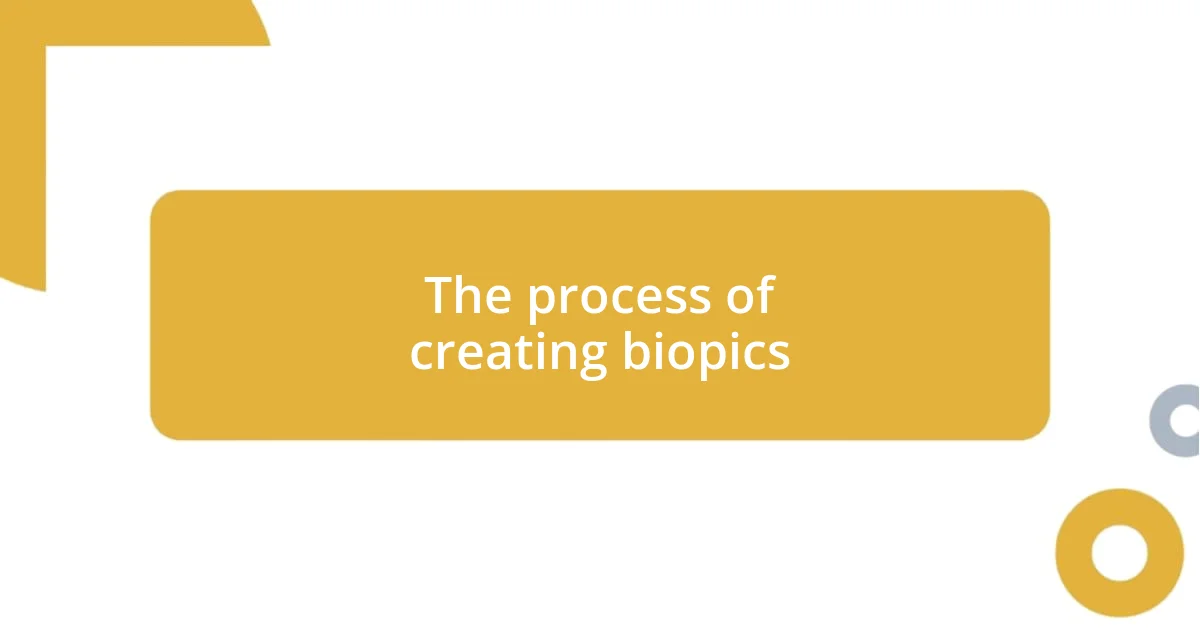Key takeaways:
- Biopics serve as emotional mirrors, allowing viewers to connect deeply with characters’ journeys and reflect on their own lives.
- Key characteristics of biopics include authenticity, character depth, emotional resonance, and cultural context, which create complex and engaging narratives.
- The future of biopics is likely to involve diverse storytelling methods, spotlight underrepresented figures, and integrate advanced technology for immersive experiences.

My introduction to biopics
My first encounter with biopics was a serendipitous experience. I remember sitting in my living room, captivated by a film that portrayed the life of a legendary artist. The way the story unfolded, blending raw emotion with historical context, left me pondering: how can someone’s life be so beautifully complex? It was in that moment that I realized biopics could serve as a mirror, reflecting the triumphs and struggles we all face.
As I delved deeper into this genre, I started to appreciate the power of storytelling through the lens of another person’s experiences. I found myself becoming emotionally attached to the characters—laughing, crying, and sometimes even feeling anger on their behalf. Have you ever been so moved by a character’s journey that it made you re-evaluate your own life choices? I certainly have. Each film almost felt like a conversation, offering me insights into the human experience that I hadn’t considered before.
Eventually, I began seeking out biopics from different cultures and eras. Each one was like peeling back the layers of a complex onion, revealing not just the individual but also the society that shaped them. These films have a unique ability to evoke empathy and understanding, making me wonder: what can we learn from someone else’s journey? Through this exploration, I found not just entertainment, but a rich tapestry of life lessons that continue to resonate within me.

My favorite biopic films
I find it hard to narrow down my favorite biopic films, but a few truly stand out. One that resonates with me deeply is “The Pursuit of Happyness.” The depiction of Chris Gardner’s journey from homelessness to success struck a chord in my heart. It’s a testament to perseverance and the unconditional bond between a father and son. Watching this film made me question my own motivations and ambitions, prompting reflections I hadn’t anticipated.
Another biopic that left a lasting impression on me is “A Beautiful Mind.” The film’s exploration of mental illness through the life of John Nash really opened my eyes to the complexities of the human mind. I remember feeling a mix of admiration and sorrow, particularly during the moments of his struggles. It’s fascinating how this film portrays not just genius, but also the painful reality behind it. It made me appreciate the importance of compassion towards those dealing with similar challenges.
Lastly, “Malcolm X” expands the narrative of a powerful figure whose life choices evoke both admiration and controversy. In my eyes, it encapsulates the relentless pursuit of justice and identity. I recall watching it on a rainy afternoon, feeling invigorated by Malcolm’s raw passion and dedication to his cause. It sparked conversations about race and identity that lingered long after the credits rolled. These films resonate with me beyond mere entertainment; they offer profound life insights that enrich my understanding of ourselves and the world around us.
| Film Title | Key Themes |
|---|---|
| The Pursuit of Happyness | Perseverance, Family Bonds |
| A Beautiful Mind | Mental Illness, Genius, Compassion |
| Malcolm X | Justice, Identity, Passion |

Key characteristics of biopics
When I think about biopics, several key characteristics come to mind that truly define this genre. They often intertwine significant historical events with the personal lives of their subjects, creating narratives that feel both informative and emotionally charged. I remember feeling a sense of responsibility while watching a film about a historical figure—realizing that their struggles and victories weren’t just stories, but reflections of real lives.
Key characteristics of biopics include:
- Authenticity: A strong commitment to portraying real events and personalities accurately.
- Character Depth: An exploration of the subject’s inner thoughts, motivations, and flaws, allowing for a deeper connection with the audience.
- Emotional Resonance: The ability to evoke feelings, making viewers empathize with the characters’ journeys.
- Cultural Context: Setting the personal story within the broader societal or historical framework, enhancing understanding of the subject’s impact.
These elements come together to create a complex narrative that feels alive. Whether it’s the triumphs, failures, or the mundane moments in between, every detail adds texture, inviting viewers like me to reflect on how history shapes personal identity. I often find myself connecting the dots between the subject’s experiences and my own life, fostering a sense of shared humanity. With every biopic I watch, I’m reminded that life’s journey can be as intricate as the stories depicted on screen.

The process of creating biopics
Creating a biopic is a multi-faceted journey that begins with extensive research. Filmmakers often dive deep into their subjects’ lives, digging through books, interviews, and archival footage to uncover both facts and nuances that truly capture the essence of the person. I recall one director mentioning how they spent months interviewing family members to understand the emotional landscape of their subject. Isn’t it fascinating how every detail can reveal layers of humanity?
Once the research is complete, screenwriters take on the critical task of crafting a compelling narrative. They need to balance factual accuracy with storytelling, which can be quite a challenge. I remember feeling a sense of awe watching behind-the-scenes footage of writers wrestling with how to portray a significant event without losing the authenticity of the character. It’s a delicate dance between truth and narrative flow, making me appreciate the creativity involved in such a process.
Casting the right actors is another crucial step in bringing biopics to life. Finding someone who can genuinely embody the emotions and experiences of the real-life figure is essential. I often wonder how actors prepare for such roles—do they immerse themselves in the subject’s world to truly understand their struggles and triumphs? I’ve read that many actors undergo transformation, sometimes even physically, to fully capture their characters, which adds another layer of authenticity. Seeing that dedication is inspiring and often resonates deeply with audiences, wouldn’t you agree?

Analyzing biopic storytelling techniques
When analyzing biopic storytelling techniques, the art of balancing truth with narrative becomes evident. I’ve noticed that many filmmakers use dramatic reenactments to highlight key moments in a character’s life, which can sometimes blur the line between fact and fiction. Yet, isn’t it this artistic liberty that allows us to feel the weight of the character’s experiences?
Flashbacks often serve as a powerful storytelling device, pulling us into pivotal moments that have shaped an individual’s journey. I recall watching a biopic where a character’s childhood memories flickered on screen, giving me a profound understanding of their adult decisions. This technique not only enriches character development but also deepens our emotional connection, reminding us that our past molds who we are.
Moreover, pacing in biopics is crucial. I’ve found that a well-timed shift from rapid action to quieter introspection can evoke a spectrum of emotions. It’s fascinating how a sudden lull in the storyline can lead to reflection, allowing viewers to digest the heavy themes being presented. This rhythm, when executed masterfully, can leave a lasting impact that resonates long after the credits roll. What techniques in storytelling have struck you the most?

Impact of biopics on society
The impact of biopics on society is profound, often sparking dialogue around the lives and legacies of influential figures. I remember a conversation I had with a friend after watching a biopic about a civil rights leader. We found ourselves discussing not just the movie but also the ongoing struggles for equality in our own time. It’s intriguing how these films can serve as catalysts for reflection and conversation about social issues, magnifying their relevance in today’s world.
Many biopics dramatize pivotal moments in history, shaping public perceptions and understanding of significant events. For instance, witnessing a biopic about a groundbreaking scientist can inspire viewers, especially young minds, to consider careers in STEM fields. When I saw such a portrayal, it reignited my own passion for learning and innovation. Have you ever felt inspired to pursue something after seeing a character’s journey unfold on screen?
Additionally, biopics often highlight the complexities of personal struggles, which can foster empathy and understanding among audiences. Watching someone overcome adversity reminds us of our own challenges, creating a shared human experience. I still think about a biopic I watched that detailed an artist’s battle with mental health. It resonated deeply with me; it seemed like a mirror reflecting the struggles many face today. How powerful it is to see our stories intertwined with those of others!

Future trends in biopics
The future of biopics seems poised to embrace diverse storytelling methods, especially with the rise of streaming platforms. I’m excited to see how filmmakers might leverage interactive storytelling tools to immerse audiences in the character’s journey. Wouldn’t it be fascinating to make choices as a viewer, diving deeper into different facets of a subject’s life?
Another trend I anticipate is a focus on underrepresented figures in history. I’ve often wondered why certain stories are overlooked, and as we push for more inclusivity, biopics may spotlight voices that have been silenced. For instance, a biopic about a lesser-known environmental activist could not only educate but inspire action in a new generation. How does exploring these narratives shift our understanding of history?
Furthermore, with advances in technology, I believe we’ll see biopics that blend reality with augmented or virtual reality experiences. Picture witnessing a significant historical event with a virtual headset, feeling as if you’re right there in the moment. This innovation could change how we emotionally connect with these stories, making them more impactful than ever. Isn’t it thrilling to think about how these developments could reshape our viewing experience?














